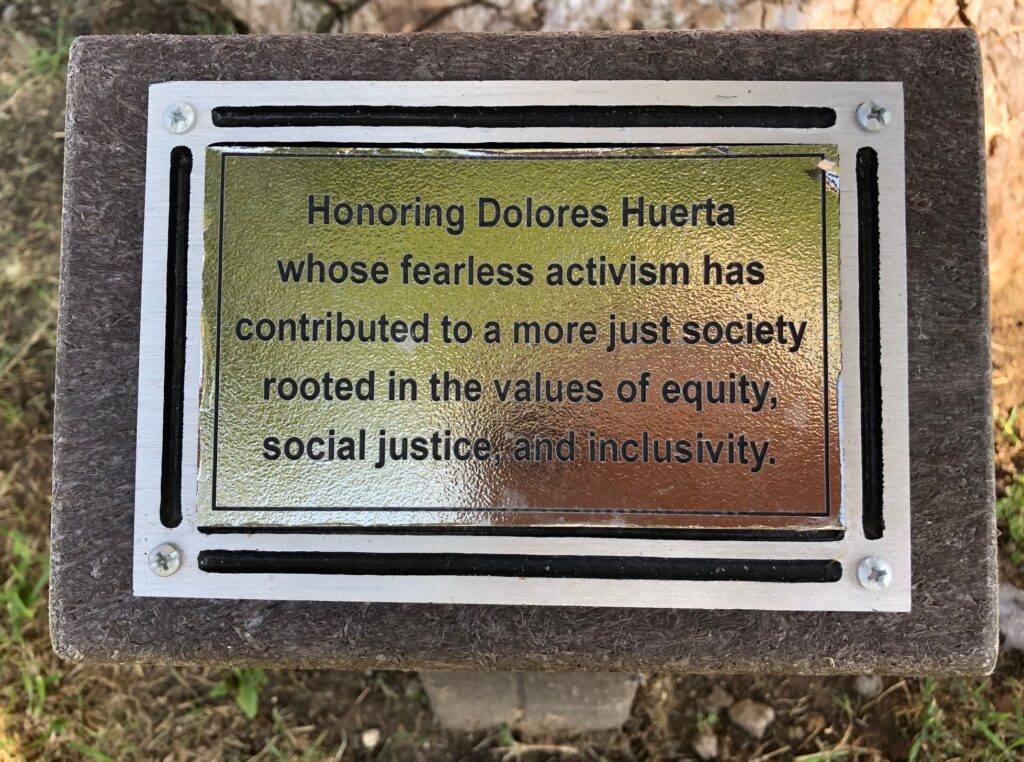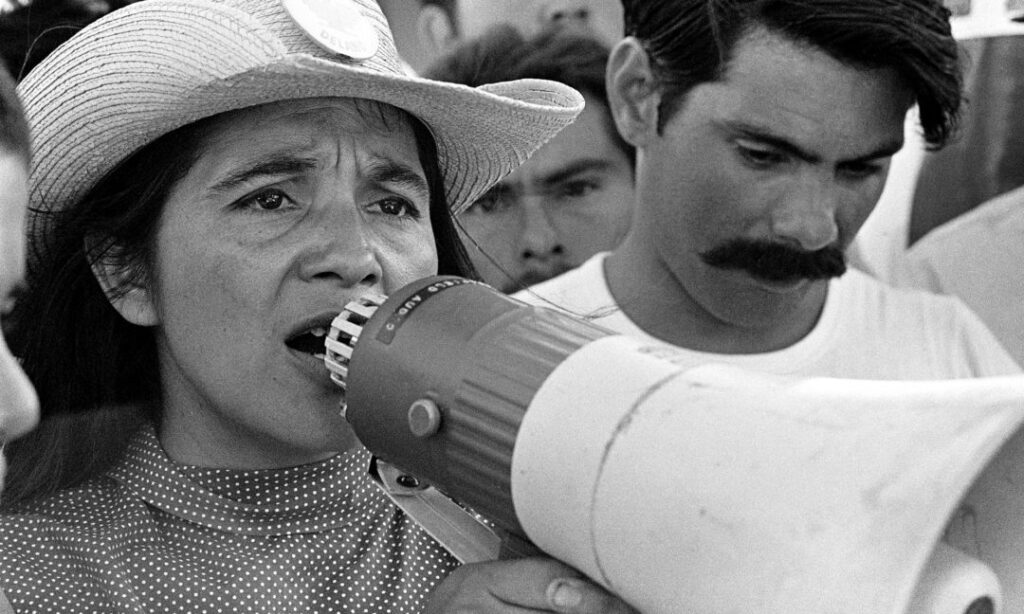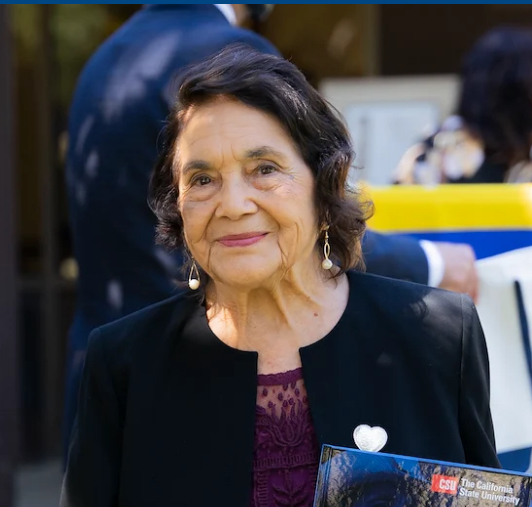—”Every moment is an organizing opportunity, every person a potential activist, every minute a chance to change the world—Dolores Huerta
CAMARILLO — In 1962, civil rights leaders Dolores Huerta and César Chavez founded what would later become the United Farm Workers. They worked side-by-side for farmworkers’ rights, but she wasn’t afraid to go head-to-head with Chavez if she disagreed with him.
“As much as she was César’s right hand, she could also be the greatest thorn in his side,” said one passage from the Dolores Huerta Foundation webpage, doloreshuerta.org. “The two were infamous for their blow out arguments, an element that was a natural part of their working relationship.”
In the name of farmworker rights, the fiery Huerta also squared off with ranchers, growers and once, the San Francisco police, who broke four of her ribs and damaged her spleen with a baton, sending her to the hospital. After months of recovery, she was back out on the streets and in the fields with her megaphone, a thundering voice for social justice.
“In Spanish she’s known as ‘La Pasionaria’ (the passionate one) said CSU Channel Islands (CSUCI) Professor of Chicana/o Studies José Alamillo, Ph.D. “In spite of her small stature, she was the fiercest.”
 Students returning to the CSUCI campus for the first time in more than a year saw a new addition along the sidewalk in front of the John Spoor Broome Library: a plaque under a tree along the walkway that reads:
Students returning to the CSUCI campus for the first time in more than a year saw a new addition along the sidewalk in front of the John Spoor Broome Library: a plaque under a tree along the walkway that reads:
“Honoring Dolores Huerta, whose fearless activism has contributed to a more just society rooted in the values of equity, social justice and inclusivity.”
In honor of Huerta’s 90th birthday on April 10, 2020, the CSU Board of Trustees passed a resolution declaring that each of the 23 campuses would individually honor Huerta with a plaque, tree-planting or some other appropriate gesture. The resolution called Huerta a “groundbreaking, fearless leader in the fight for civil rights” and a “champion of access to higher education.”
CSUCI leaders will hold an event to honor the placement of the plaque on campus on Thursday Oct. 21 from 3-5 p.m. at the Central Mall.
The timeline may have been delayed, but Alamillo believes Huerta’s messages about social justice are timeless, and that students need to learn about her, and what she fought for and continues to fight for.
“Sometimes it’s really challenging for students to step out of their comfort zone and take risks, but I think she definitely can remind students of the importance of speaking against labor and environmental injustices,” Alamillo said. “She taught us to never forget about the people who have it the worst.”

Coachella, CA: 1969. United Farm Workers Coachella March, Spring 1969. UFW leader, Dolores Huerta, organizing marchers on 2nd day of March Coachella. © 1976 George Ballis/Take Stock / The Image Works NOTE: The copyright notice must include “The Image Works” DO NOT SHORTEN THE NAME OF THE COMPANY
Huerta’s activism is rooted in the fields of Stockton, California, where she grew up as the daughter of a divorced mother who worked two jobs to support Huerta and her brother. Huerta became a teacher briefly in the 1950s, but after seeing so many barefoot, hungry farmworkers’ children, she decided she could do more good by organizing the farm workers, to make them into a force to be reckoned with.
When she saw the conditions under which the children’s parents were working in the fields, she knew she made the right decision.
“The farmworkers were only earning about 70 cents an hour at that time – 90 cents was the highest wage that they were earning,” Huerta said during a 2020 interview with the New York Times. “They didn’t have toilets in the fields; they didn’t have cold drinking water. They didn’t have rest periods. People worked from sunup to sundown. It was really atrocious.”
Huerta founded the Agricultural Workers Association to organize the farmworkers. Then she met Chavez and they realized their goals were aligned, so in 1962, they founded the National Farm Workers Association (NFWA), the predecessor of the United Farm Workers (UFW).
She and Chavez negotiated contracts, advocated for safer working conditions and fought for unemployment and healthcare benefits for the farmworkers.
The Smithsonian Institution has a traveling exhibit called “Dolores Huerta: Revolution in the Fields” that documents Huerta’s activism in the 1960s and ‘70s. Alamillo and Director of the Center for Community Engagement Pilar Pacheco hope to bring the exhibit to the CSUCI campus sometime in spring of 2023.
Alamillo and then-Associate Vice Provost for Student Success and Equity Initiatives Amanda Quintero, Ph.D., led the charge to have the plaque installed in 2020, a campus tribute to a national leader who knows the value of higher education.
“She understands the importance of finding your voice in order to be a changemaker,” Alamillo said. “In order to find your voice, you have to get a degree.”
Huerta re-emphasized her faith in the next generation of college graduates during her interview with the Times a year ago.
“I think that young people are the ones who are going to drag us into the 21st century and to get rid of fossil fuels, create green energy jobs and to develop an economy that will help everyone — not just a few,” she said. “And I can’t say exactly how we’re going to do that, but I think that we are smart enough.”
About California State University Channel Islands — CSU Channel Islands (CSUCI) is reimagining higher education for a new generation and era. We are an innovative higher education institution that enables students to succeed and thrive – serving as an engine for social and economic vitality that provides the intellectual resources necessary for a thriving democracy. With more than 7,000 students, 1,200 employees and 14,000 alumni, CSUCI is poised to grow in size and distinction, while maintaining one of the most student-focused learning environments in public higher education. Connect with and learn more by visiting www.csuci.edu or CSUCI’s Social Media.
The University encourages persons with disabilities to participate in its programs, events and activities. If you anticipate needing any type of accommodation, or have questions about the physical access provided, please contact the respective area below as soon as possible, but no later than seven (7) business days prior to the event/activity:
CSUCI Students
Disability Accommodations & Support Services: accommodations@csuci.edu
CSUCI Employees
Human Resources: angela.portillo@csuci.edu
Members of the Public
Title IX & Inclusion: titleix@csuci.edu

